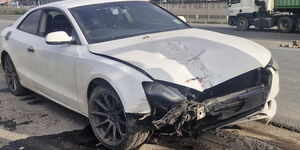Kenya's second-hand car market is experiencing the adverse effects of Kenya's free-falling shilling, with car prices going up by as much as Ksh500,000.
As a result, Kenyans are steering clear of the market leaving vendors with unsellable cars.
According to the latest data from the Kenya National Bureau of Statistics (KNBS), new vehicle registrations dipped 33% to 52,999 in the nine months to September from 79,078 in a similar period last year.
Between August 2020 and September 2020, the number of newly registered cars went from 31,359 down to 25,710 units.
Production in Japan has gone down due to Covid-19 and now people are holding onto their cars, and the second-hand cars mainly of eight years are becoming increasingly difficult to get.
Second-hand cars from Japan dominate Kenya's car market, controlling more than 80% of the overall market share, with an estimated Ksh60 billion spent annually.
“When we were buying the dollar between 101 and 105, this did not have much of an impact but now it is 110 and the effects are huge. Some models like an eight-year-old Land Cruiser V8 will cost at least Ksh480,000 more without taxes, so you add taxes to this and it goes above half a million shillings,” a car seller told the media.
The 2013 Toyota Fielder now costs Ksh1.5 million per unit from Ksh1.3 million while the price of Toyota Axio 2013 model is set at Ksh1.25 million up from Ksh1.1 million.
Luxury brands such as Mercedes Benz and the Land Cruiser V8 series have registered the biggest surge in prices ranging between Ksh300,000 and Ksh400,000.
To compound the crisis facing this particular industry, recent reports revealed that car importers are worried hundreds of 2013-manufactured vehicles being locked out of Kenya under the six-year rule, leading to losses running into millions.
There is also a shortage of ships in Europe and other key market sources, the industry lobby group, Car Importers Association of Kenya (CIAK) announced.
The last day for 2013 manufactured vehicles to be cleared into the country under the age limit rule is December 31, meaning importers have 29 days to ship in all their units falling within the cut off date.
In 2014 when more than 2,000 units registered in 2006 were locked out of the country after arriving later than December 31, resulting in losses running in the millions of shillings by dealers and individual importers alike.
The shilling has been on a free fall since March 13, when Health CS Mutahi Kagwe announced the first Covid-19 case in the country.
Kenya's currency hit a new historic low on Monday, November 30, trading at 110.05 units to the US dollar, signaling a rise in the cost of living as importers are expected to pass the bill to consumers.
Uncertainty on the future (due to the pandemic) across the world has been highlighted as a key reason why people prefer holding dollars and other hard currencies, thereby impacting negatively on the local currency.
On a positive note, the market is currently ripe for Kenyans looking to resell their personal cars as prices of imports soar.












